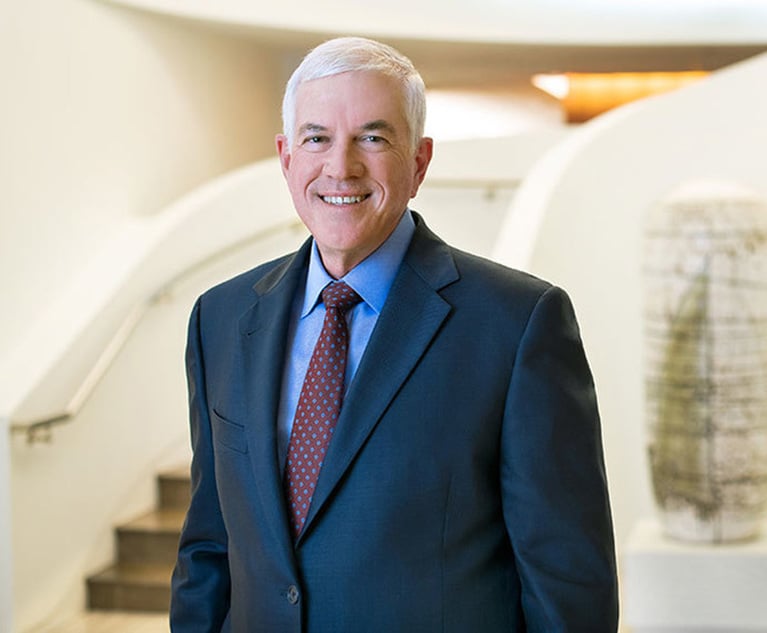Honesty in Negotiations? Do the Ethics Rules Require or Expect it?
The apparent tension between truthfulness in dealing with others and the back-and-forth way that negotiations between humans have occurred across time and cultures is not directly addressed by the letter of any of the Model Rules, but is dealt with in a comment to Rule 4.1 Truthfulness in Statements to Others.
February 09, 2023 at 01:37 PM
6 minute read
Ethics Mark Hinderks of Stinson, LLP. Courtesy photo
Mark Hinderks of Stinson, LLP. Courtesy photo
Dear Ethics Lawyer
This column, written by Mark Hinderks, of Stinson LLP, focuses on ethics questions. The discussion here is based on the ABA Model Rules of Professional Conduct, but the Model Rules are often adopted in different and amended versions, and interpreted in different ways in various places. Always check the rules and authorities applicable in your relevant jurisdiction—the result may be completely different.
Question: I understand the importance of lawyers being truthful in their interactions with clients, courts and even opposing parties. However, it seems like this breaks down in negotiations. For example, when I'm negotiating a settlement of a case and the opponent says at the outset that $1.3 million is all she will offer, I'm 95% certain that she will ultimately go to $1.8 million or higher. Typically, I would start by telling her we wouldn't take less than $2.5 million, even if I know that $1.8 million would be a fair and acceptable result for the client. If I throw that out at the beginning, I'll never get that amount. It's almost like we have to go through a back-and-forth numbers dance before either side will believe they've found the bottom line settlement point.
And, I'm pretty sure this happens when business lawyers negotiate deals to buy and sell companies or property—it's just the way things work. But how does this dishonesty about ultimate positions fit within the ethics rules? And are there lines here that shouldn't be crossed?
This content has been archived. It is available through our partners, LexisNexis® and Bloomberg Law.
To view this content, please continue to their sites.
Not a Lexis Subscriber?
Subscribe Now
Not a Bloomberg Law Subscriber?
Subscribe Now
NOT FOR REPRINT
© 2025 ALM Global, LLC, All Rights Reserved. Request academic re-use from www.copyright.com. All other uses, submit a request to [email protected]. For more information visit Asset & Logo Licensing.
You Might Like
View All

Avoiding Conflict When Relating Advice to an Adverse Party to Facilitate a Client Matter
4 minute read
Matt's Corner: Pa.R.D.E. 217—Obligations of a Formerly Admitted Attorney
2 minute read
Law Firms Mentioned
Trending Stories
- 1Midsize Firm Bressler Amery Absorbs Austin Boutique, Gaining Four Lawyers
- 2Bill Would Allow Californians to Sue Big Oil for Climate-Linked Wildfires, Floods
- 3LinkedIn Suit Says Millions of Profiles Scraped by Singapore Firm’s Fake Accounts
- 4Supreme Court Agrees to Hear Lawsuit Over FBI Raid at Wrong House
- 5What It Takes to Connect With Millennial Jurors
Who Got The Work
J. Brugh Lower of Gibbons has entered an appearance for industrial equipment supplier Devco Corporation in a pending trademark infringement lawsuit. The suit, accusing the defendant of selling knock-off Graco products, was filed Dec. 18 in New Jersey District Court by Rivkin Radler on behalf of Graco Inc. and Graco Minnesota. The case, assigned to U.S. District Judge Zahid N. Quraishi, is 3:24-cv-11294, Graco Inc. et al v. Devco Corporation.
Who Got The Work
Rebecca Maller-Stein and Kent A. Yalowitz of Arnold & Porter Kaye Scholer have entered their appearances for Hanaco Venture Capital and its executives, Lior Prosor and David Frankel, in a pending securities lawsuit. The action, filed on Dec. 24 in New York Southern District Court by Zell, Aron & Co. on behalf of Goldeneye Advisors, accuses the defendants of negligently and fraudulently managing the plaintiff's $1 million investment. The case, assigned to U.S. District Judge Vernon S. Broderick, is 1:24-cv-09918, Goldeneye Advisors, LLC v. Hanaco Venture Capital, Ltd. et al.
Who Got The Work
Attorneys from A&O Shearman has stepped in as defense counsel for Toronto-Dominion Bank and other defendants in a pending securities class action. The suit, filed Dec. 11 in New York Southern District Court by Bleichmar Fonti & Auld, accuses the defendants of concealing the bank's 'pervasive' deficiencies in regards to its compliance with the Bank Secrecy Act and the quality of its anti-money laundering controls. The case, assigned to U.S. District Judge Arun Subramanian, is 1:24-cv-09445, Gonzalez v. The Toronto-Dominion Bank et al.
Who Got The Work
Crown Castle International, a Pennsylvania company providing shared communications infrastructure, has turned to Luke D. Wolf of Gordon Rees Scully Mansukhani to fend off a pending breach-of-contract lawsuit. The court action, filed Nov. 25 in Michigan Eastern District Court by Hooper Hathaway PC on behalf of The Town Residences LLC, accuses Crown Castle of failing to transfer approximately $30,000 in utility payments from T-Mobile in breach of a roof-top lease and assignment agreement. The case, assigned to U.S. District Judge Susan K. Declercq, is 2:24-cv-13131, The Town Residences LLC v. T-Mobile US, Inc. et al.
Who Got The Work
Wilfred P. Coronato and Daniel M. Schwartz of McCarter & English have stepped in as defense counsel to Electrolux Home Products Inc. in a pending product liability lawsuit. The court action, filed Nov. 26 in New York Eastern District Court by Poulos Lopiccolo PC and Nagel Rice LLP on behalf of David Stern, alleges that the defendant's refrigerators’ drawers and shelving repeatedly break and fall apart within months after purchase. The case, assigned to U.S. District Judge Joan M. Azrack, is 2:24-cv-08204, Stern v. Electrolux Home Products, Inc.
Featured Firms
Law Offices of Gary Martin Hays & Associates, P.C.
(470) 294-1674
Law Offices of Mark E. Salomone
(857) 444-6468
Smith & Hassler
(713) 739-1250





